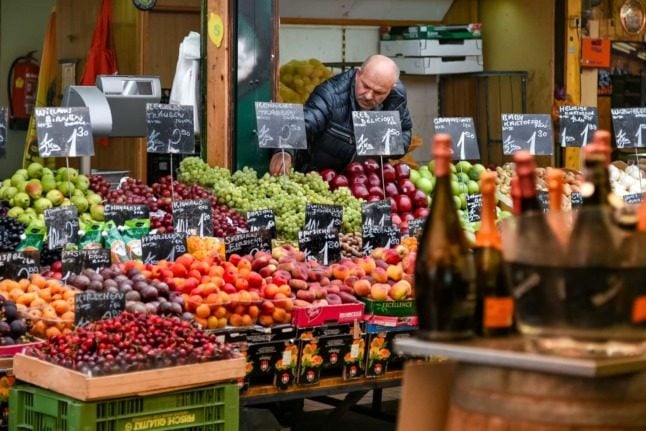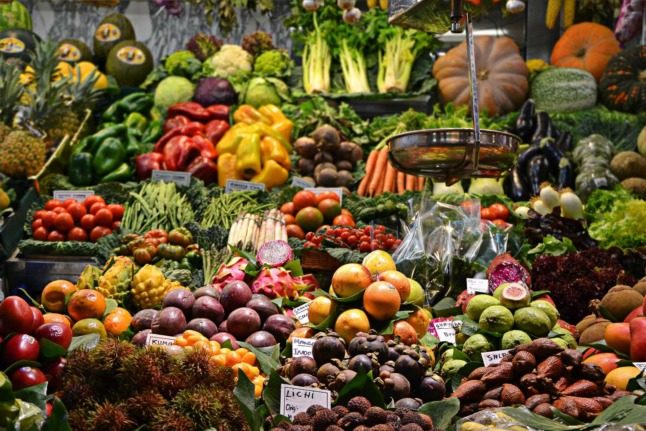While Switzerland’s grocery stores are a good bit cheaper than restaurants or bars, they will still often charge eye-watering amounts.
That said, there are a few ways to save money when doing your regular shop.
While some of these are Swiss-specific, others are valid everywhere (you might even remember them from your student days).
If we’ve missed anything, let us know in the comments or get in touch at [email protected].
Tips for Switzerland (and probably everywhere else)
So as with almost everything on The Local Switzerland, the advice is tailored to life here in the Confoederatio Helvetica.
There are some tips however which are universal and will help you save on groceries whether you are in Switzerland or abroad.
Probably the first step in considering how to save money is to remember your student days.
Cost of living in Switzerland: How to save money if you live in Zurich
Rice and pasta are relatively cheap in Switzerland, while meat and cheese are comparatively expensive.
Making a large amount of food and freezing it is a possibility, particularly if you buy the meat from a discount retailer like Aldi and Lidl.
Another tip is to keep an eye on food close to its expiration date.
While buying expired meat and cheese is a sure fire way to upset your stomach (and perhaps anyone else in your vicinity), getting stuff close to its expiry date will pose few risks and save quite a bit.
Also know the difference between ‘best before’ and ‘expiry/use by’ dates.
While pasta and canned food may survive forever and well past the best before date, Bernese blood tongue sausage will not.
Coupons and regular specials/deals – whether online or in print like supermarket magazines – are also very much a thing in Switzerland and are worth looking into.
Discount supermarkets
After arriving in Switzerland, it won’t take you long before you work out the hierarchy of Swiss supermarkets.
At one end are luxury supermarkets like Manor and Globus – and in the middle are Migros, Denner and Coop (although Coop tends slightly more expensive than Migros and Denner is the cheaper of the three).
At the cheaper end are Germany’s Lidl and Aldi, which is known here as Aldi Suisse.
These discounters offer some of the most reasonably priced groceries in Switzerland.
Be aware that they lack the conveniences of other supermarkets in the UK, US or France. You won’t find many large brands, while you will often need to take your products out of boxes and bag your groceries yourself (although that is relatively common place in Switzerland).
READ MORE: How the cost of living will change in Switzerland in 2022
Avoiding supermarkets entirely
Even discount supermarkets can be pricey in Switzerland, while the range tends to be relatively predictable.
One option is to visit a farmer’s market, where Switzerland’s best and close-to-best produce can be bought at prices cheaper than supermarkets.
Often the food will be fresher and while there may be a few spots on your apples, it’ll taste as good or better than supermarket fare.
Be aware though that while farmers markets are cheap, not all outdoor markets are created equal.
Fancy, inner city, designer markets will often have boutique and craft-style offerings where you can shake the hand of the cow that produced the cheese, but where prices will rival those seen in higher-end supermarkets.
So when it comes to markets, be sure to shop around and compare the costs with those in your local supermarket.

BYO bags
A relatively simple one which will become habit in no time, but bringing your own bags is a great way to save a little cash when doing your grocery shop.
EXPLAINED: How to find cheap train tickets in Switzerland
Swiss supermarkets, like many across Europe, have sought to phase out single-use bags for environmental reasons.
If you’ve forgotten to bring your own bags there are always reusable or single use bags available, although you will have to pay.
Readers from the US have previously told us that they didn’t realise they were being charged for single-use bags every time they did a grocery shop – which can add up to several francs at the end of the year.
Loyalty schemes
Most major Swiss supermarkets have loyalty schemes where you can accrue points with every purchase.
You’ll be offered rewards for your loyalty, while in other cases your points become purchase credits.
EXPLAINED: The real reason Swiss supermarket Migros doesn’t sell alcohol
These loyalty schemes will usually be available at all retail outlets operated by the same company, i.e. Coop’s Supercard program is available at Coop Pronto (gas stations and convenience stores) and Coop City, while Migros’ Cumulus program is also available at Migrolino and Migrol (gas stations).
As with all loyalty schemes, the idea is to get you to spend more at the one store, so be careful to ensure you don’t end up spending more than you otherwise would if you weren’t being loyal.
Seasonal food
Switzerland remains a country of traditions and as such seasonal food is very much still a thing.
Foods in season will be more plentiful and likely cheaper, particularly as they will not need to be imported.
This especially applies to fresh foods like blueberries and white asparagus, but other staples will also see fluctuations.

Don’t go shopping in Switzerland
OK so this isn’t always possible depending on where you live, but for people in cross-border regions it is common place to go shopping in either Germany, Italy or France (and even Austria, although the mountain passes can make it difficult).
Shopping across the border can lead to serious savings over time – particularly in Germany – although there are Covid rules and tax regulations to be aware of.
You can find out more about these at the following links.
READ MORE: What are the current rules for Swiss cross-border shopping in Germany?
READ MORE: The rules Swiss cross-border shoppers in France and Italy should know
Keep in mind however that while most standard groceries will be cheaper abroad, this is not always the case.
As we discussed in this article, some things are actually cheaper in Switzerland.
One major example is petrol, with Switzerland’s lower fuel taxes making non-diesel fuel cheaper in Switzerland – with the French and the Germans crossing the border to fill up here.
READ MORE: Where in Switzerland can you find the cheapest fuel?
Order online from abroad
Good news for people who like to purchase goods on the Internet: from January 1st, Swiss customers will no longer be denied access to foreign online shopping platforms.
Currently, anyone in Switzerland who tries to access the “.de” or “.fr” version of a merchant site, is automatically redirected to a Swiss sales portal where the merchandise is more expensive.
But from January 1st, the law will ban geo-blocking on the internet in this area, a rule in force in the EU since 2018.





 Please whitelist us to continue reading.
Please whitelist us to continue reading.
Member comments